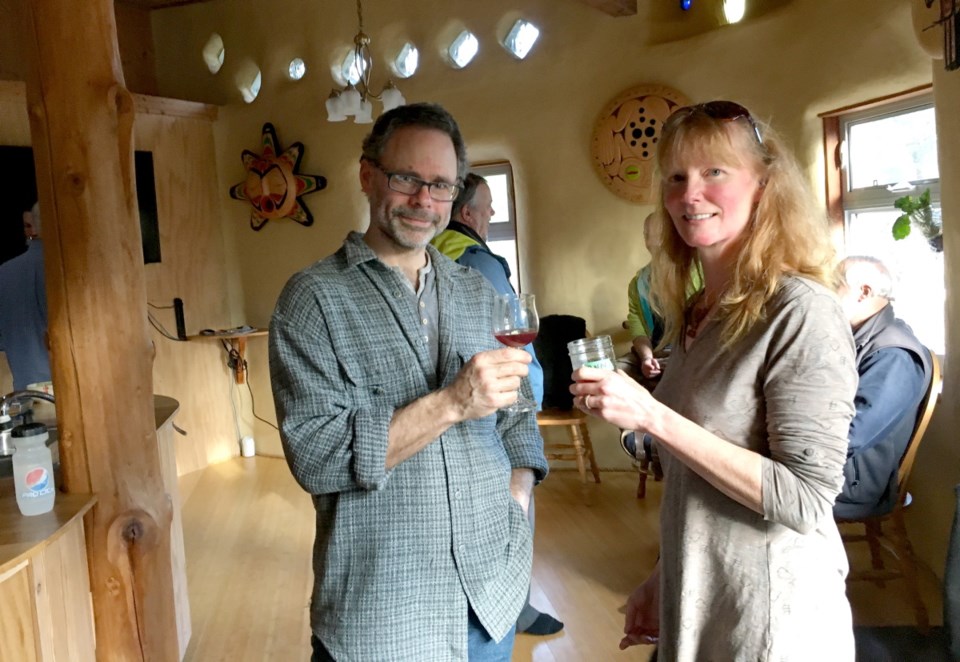Last weekend, I drove up to the home of Ann and Gord Baird in Highlands and stashed the empty to-go coffee cups under the seat.
The Bairds, who are also Highlands councillors, were hosting a party called B.C. Wine, B.C. Cheese and B.C. Whiners. I decided it was something I had to attend.
I’ve been following the news stories about Alberta’s call to boycott B.C. wine. I’ll admit I like it when politics get humorous, so going to a party in the spirit of it was something I didn’t want to miss.
The Bairds are the most environmentally conscious people I know; the invitation encouraged people to arrive on foot, bicycle or electric vehicle. I arrived in a minivan and had my daughter help me hide garbage under the seat.
This party was about more than celebrating wine. The Bairds are unsurprisingly against a pipeline, too.
Their entire lives are built around sustainability and personal accountability. They built their own cob house that runs off solar panels, they collect and re-use rainwater, have composting toilets and grow nearly all of the produce they consume annually. They ferment their own apple wines and make their own cheese.
Every time I leave their home, it makes me want to do a better job of living more sustainably myself. My daughter also loved using their washroom and dropping a handful of woodchips in the toilet.
When I first heard of Alberta boycotting B.C. wine, I almost couldn’t believe it was Alberta Premier Rachel Notley asking residents to participate. Watching Notley say: “The gloves are off,” stopped me in my tracks and I needed a double-take to see if this were true. It was.
“The B.C. wine boycott is childish,” said Ann Baird. “Our local vineyards shouldn’t have to pay the price for this sort of thing. This is just creating conflict between two provinces.”
I have known the Bairds for many years, and have watched their homestead evolve. I first met them when I was a reporter covering their sustainable home.
At their party, guests including David Grove, a retired bakery owner, arrived driving electric vehicles and speaking of sustainable initiatives such as permaculture gardening and solar power. Grove laughed about the boycott and admitted: “It’s nice to have an excuse to get together with people and drink some B.C. wine.”
Even if B.C. has a proposal to restrict shipments of diluted bitumen or wants to review the potential for oil spills from Kinder Morgan’s Trans Mountain pipeline expansion, that has nothing to do with B.C. wine.
Sure, the pipeline is a controversial issue and there are conflicting views within our province and across the border into Alberta. I am just not sure how oil and wine mix, but there’s a better way to get a message across.
At this party, I was a little out of my league with the sustainability crowd, but appreciated everyone’s efforts all the same. It’s not just anti-pipeliners who laugh at this boycott.
I was speaking with a friend of mine who grew up in Alberta, as did I, and she mentioned friends living in Alberta who are drinking B.C. wine because they disagree with the boycott.
About 10 per cent of B.C. wine is exported to Alberta, making up 30 per cent of the wine in Alberta. It seems the boycott would have a bigger impact on Alberta than B.C.
When Notley said: “We need to start acting as a country again,” I agree with her, but unfortunately, I think her boycott is making more of a divide. If former U.S. first lady Michelle Obama were involved, she would say: “When they go low, we go high.” That’s the opposite of a boycott.
The B.C. wine industry is gaining more champions through this exposure. Quebec is jumping into the political wine game with its support and solidarity with the hashtag #QClovesBCwine. Other provinces are also jumping in and supporting the B.C. industry.
I’ve spoken with friends who have made trips to the liquor store to purchase B.C. wine, specifically due to this controversy. Twitter has been filling up with the hashtags #BCwinepledge, #pinonotpipeline #toastthecoast and #makewinenotwar.
Either way, I am hearing more talk about wine than the pipeline.
Charla Huber works in communications and Indigenous relations for M’akola Group of Societies.



